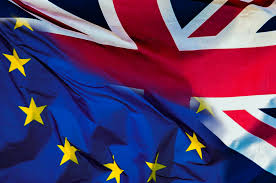Rule Britannia: Britain Ditches the European Union

February 14, 2020
Cheers echoed throughout as cameras snapped hundreds of pictures of a British politician. With a bright smile and his arms raised for victory, Nigel Farage took to the stand and spoke, “The dawn is breaking on an independent United Kingdom!” Farage, the Leader of the United Kingdom Independence Party, claimed success for the Leave campaign as 51% of the nation voted to secede the European Union. For the next four years, the United Kingdom would plunge headfirst into political chaos as Parliament bickered back and forth over an exit strategy. It would take two general elections and a new Prime Minister to finally pass a mutually agreed plan to fulfill the goals set out in Brexit. On January 31, the United Kingdom officially exited the European Union with mixed feelings at home and abroad. Still, the question virtually the entire world is asking still remains: What is to come after Brexit?
Following Britain’s official exit from the European Union, the UK will enter into a transitionary period with the European Union to negotiate Britain’s relationship with the EU. According to the British government, a political declaration defining the process necessary for a future relationship between both parties has included, “[The] safeguard [of] rules-based [on] international order, the rule of law and promotion of democracy, and high standards of free and fair trade and workers’ rights, consumer and environmental protection, and cooperation against internal and external threats and their values and interests.” Currently, not much has changed following Britain’s departure from the European Union. Britain’s transitionary period will end on December 31, 2020, which will finally cement Britain’s relation with Europe for the years to come. But despite all the talks, what will actually come from it?
It goes without saying that diplomatic tensions between the UK and EU makes for a rocky transitionary period. Nigel Farage’s departure speech in the EU Parliament was cut short after his fellow MP’s waved the Union Jack, the national flag of Great Britain. Boris Johnson, incumbent Prime Minister of the United Kingdom, has also been ridiculed by European politicians for taking an aggressive stance on European succession. Many Europeans and pro-Europe British citizens are afraid that Johnson’s stance on Brexit will bring the UK closer to an Anglo-American relationship. However, according to a recent Business Insider article, “Trump’s relationship with European countries has suffered in recent months following threats to impose tariffs on the EU and trigger a trade war.” The article goes on to write that, “…Diplomatic relations between Trump and his “friend” Boris Johnson have cooled significantly in recent weeks. …[Following] the Prime Minister’s decision in January to let Chinese telecoms giant Huawei build its 5G network, despite intensive lobbying from the US amid security concerns.”
Despite the fears of disunity between the US and EU, EU Commission President Ursula Von der Leyan ensured European MEP’s to remain hopeful for future UK-EU trade relations. Von der Leyen addressed the EU Parliament saying, “Something we have never ever before offered to anybody else: a new model of trade, a unique ambition in terms of access to the single market, but of course this would require corresponding guarantees on fair competition and the protection of social, environmental and consumer standards. In short, this is plain and simply this level playing field.” The British, still combative of EU rules and regulations, have still pressed ahead with free trade between the two parties.
The future is the present and the ideal Brexit has still yet to be envisioned. Only time and adequate diplomacy will tell of Britain’s future on the world stage and what will come of the current European Union. Will other members seek succession? Will the EU need to reform to appease dissenters? Only time will tell.

